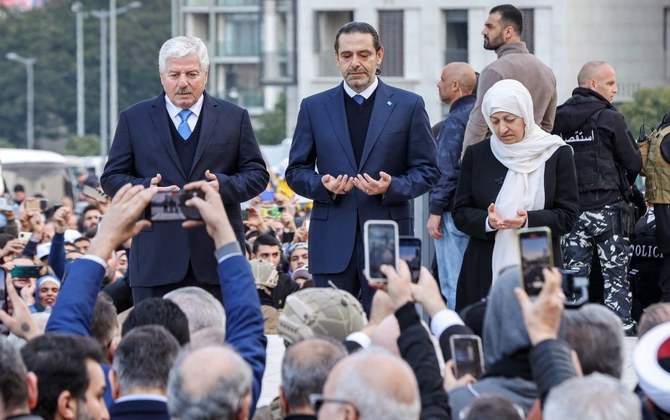BEIRUT: Lebanon on Tuesday commemorated the 18th anniversary of the assassination of Rafik Hariri. Thousands of people gathered at the memorial to the former Prime Minister in downtown Beirut, alongside his son, Saad Hariri, sister Bahia Hariri and dozens of political, diplomatic, social, intellectual, and religious figures and supporters of the Future Movement.
A torch was lit at 12:55 p.m. at the time and place at which a suicide truck bomb detonated in 2005 as a convoy in which Hariri was traveling passed by, killing dozens of people and wounding hundreds. Several perpetrators, with links to Hezbollah, have been convicted by the Special Tribunal for Lebanon, which was tasked with investigating and prosecuting the case, for their roles in the assassination. They remain free as Hezbollah refuses to hand them over.
After withdrawing from political life about a year ago, former Prime Minister Saad Hariri returned to Beirut for the commemoration of his father. He shared only a few words with the people gathered at the memorial, saying: “May God help Lebanon.”
Speaking later from the Hariri residence in Beirut, he added: “You are Lebanon’s guarantee and I am all yours. I have already told you that this house will remain open and, God willing, it will remain open with your presence and love. You are the good people who wept for Rafik Hariri and this house will complete this journey with you, God willing.”
The security services took strict precautions in the area around the memorial to protect those who flocked to it from neighborhoods in Beirut and from the north, the Bekaa, and the south. They raised the blue banner of the Future Movement and chanted in support of Rafik and Saad Hariri. They also recited verses from the Qur’an as they offered prayers for the souls of Hariri and the bodyguards who died and were buried alongside him.
When Arab News spoke to some of those who had gathered at the memorial, they all pledged their continuing loyalty to Hariri’s memory, and hailed his work to rebuild Beirut following the 1975-1990 civil war.
“No one was held accountable for Hariri’s assassination and no one is being held accountable for the (2020) Beirut port explosion. Injustice prevails,” said a Future Movement supporter from Tripoli.
Many also spoke of their desire for someone to fill the current void in the country’s Sunni political leadership.
A woman from Beirut said: “Political life in Lebanon will never get back on track if they keep shooting down the Sunni community. The new Sunni representatives in parliament are unable to form an effective or balanced bloc.”
Saad Hariri seemed moved when the crowds that had gathered cheered for his return to politics. He moved away from bodyguards and the security forces to greet the people and shake their hands.
On Monday, Saad Hariri received a phone call from former President Michel Aoun, whose media office said had urged him to return to Lebanon after a long absence because the country needed all of its people on this day.
In the southern city of Sidon, the birthplace of Rafik Hariri, people marked the anniversary of his assassination by displaying his picture in the streets with the words: “Eighteen years and Sidon remains loyal. We will not forget, O martyr of Lebanon.”
Parliamentary Speaker Nabih Berri said: “On the anniversary of the martyrdom of Rafik Hariri, we are all called upon to show the political morality in which the great, late man believed, in agreement, partnership and acceptance of the other. We thus reject any attempt to harm the Taif Agreement (that ended the civil war) or Lebanon.”
The US ambassador to Lebanon, Dorothy Shea, visited the Rafik Hariri Memorial and laid a wreath.
The Russian ambassador, Alexander Rudakov, also laid a wreath there, and the Russian Foreign Ministry issued a statement describing Hariri as “a great national figure, a prominent politician and a friend of Russia, who was assassinated in a despicable terrorist act in Beirut.”
It added: “The assassination of one of the most prominent figures revered by the Lebanese people remains an irreparable loss for Lebanon and its friends in the world.
“He played an important role in reaching the Taif Agreement, which put an end to the bloody and destructive civil war in Lebanon, and he exerted all his efforts to rebuild the homeland.
“He visited Russia many times and exerted an impressive personal effort in strengthening and developing the Russian-Lebanese ties.”
Since the assassination of Hariri, Hezbollah has worked quietly but intensively to integrate Lebanon into the Iranian axis in the region.
Saad Hariri resigned as prime minister following public protests in 2019. After his failure to form a new government, as a result of arguments between parties over quotas for ministerial positions, especially from the Free Patriotic Movement, and his subsequent decision to distance himself from politics, several groups have tried to share the Sunni political leadership.
Meanwhile, relations with Lebanon’s Arab allies cooled after Hezbollah used its influence as a platform for adopting a hostile stance toward them and for efforts to smuggle contraband into them.
Meanwhile, Lebanon has been on downward economic spiral and eventual collapse since 2019, in particular after the state failed to pay debts owed in foreign currencies.
On Tuesday, the Lebanese pound dropped to another record low, trading at 73,000 to the dollar; the black market for the currency had closed at 68,000 on Monday. Some gas stations refused to sell fuel as they awaited instructions on new prices.
























